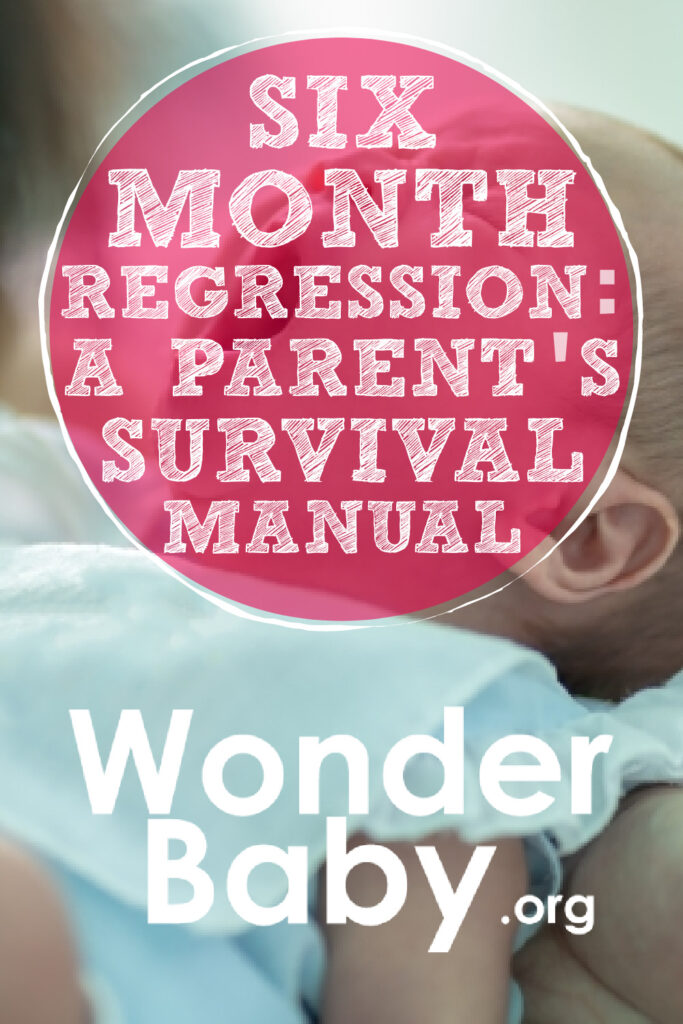6 Month Sleep Regression: A Parent’s Survival Manual

- A 6 month sleep regression is standard for infants.
- Sleep regressions typically happen during a big leap in your child’s development
- A tell-tale sign of a sleep regression is prolonged sleep disturbance.
- Your baby’s sleep will likely return to its normal rhythm after two to four weeks.
- Several tried and true strategies will help your infant sleep through the night.
Sleep regressions are a regular part of your infant’s life. Every 1 to 2 months, your baby has a rapid change in development, causing infant sleep issues, feeding difficulties, and temperament and mood changes. All these shifts may leave you frustrated, burnt out, and discouraged.
You may have thought you and your infant were out of the weeds regarding sleep regressions at 6 months old. However, it’s perfectly normal for your infant to undergo another sleep regression at this age.
Even though the 6-month sleep regression is normal, that doesn’t mean it’s easy.
This all-in-one guide will help you navigate your infant’s 6-month sleep regression and get your baby sleeping again.
6 Month Sleep Regression: Why It Happens
There are several reasons why your infant may go through another sleep regression at 6 months old. These can include their age, development, changes to routine, illness, or teething.
Age
At the 6-month mark, your infant recognizes familiar people, can interact with smiles, babbles, and coos, and may be fascinated with their reflection in a mirror. Their primary mode of learning is putting everything in their mouth. Your baby can most likely sit up with some support, rolls from their tummy to their back, and blows raspberries or makes gurgling sounds.
All these changes take a toll on your little one’s daily routines, including sleep. Thus, you might see some inconsistent sleep patterns at this age.
Stage
Your 6-month-old is rapidly growing and making connections to the world around them and their own body. It’s important to set reasonable expectations for your child as they grow.
Even though your child can’t verbally express how growing is making them feel, they share their discontent through sleeping problems, saying ‘no’ to certain solid foods, and maybe even revert to more night feedings for comfort.
Development
Babies at six months old are still very attached to their primary caregivers and require extra comfort and love when they go through developmental milestones. Separation anxiety is a common experience and is a healthy sign of good attachment.
This can mean more frequent wakings and a desire to be held while sleeping at night.
Schedule Shifts
Some babies are sensitive to changes in their daily routines. If your baby has had any changes in their schedule, a sleep regression is likely while they adjust. If your baby has recently switched to a different nap schedule, such as dropping a nap or getting longer stretches of sleep during naps, it can impact their nighttime sleep.
Illness and Teething
If your infant has recently been sick or teething, their sleep regression may be the result of adjusting to the discomfort they feel in their body. Teething pains cause pressure in the gums, jaw, ears, neck, throat, and sinuses, making laying down uncomfortable for your child. You can help your teething baby with a few simple remedies to help them sleep.

Do All Babies Go Through a 6 Month Sleep Regression?
Sleep Regressions Are Normal
Sleep regressions are a normal part of a baby’s development. Whether they happen at 4, 6, or 9 months, your baby will most likely go through at least one sleep regression.
Not All Babies Have a Sleep Regression at Six Months
While a sleep regression is more likely at 4 months, a 6 month sleep regression is possible for any infant. As a parent, you can’t prevent a sleep regression from happening, but you can reduce the risk of making the sleep regression a new normal sleep pattern.
How to Tell if Your Baby Is Having a 6-Month Sleep Regression
Sometimes it can be difficult to tell whether your baby is having a sleep regression or just an off few nights. If your child goes through a true sleep regression, they will have trouble sleeping for several days. In addition to the length of time your child’s sleep is impacted, there are a few tell-tale signs your baby is in a six-month sleep regression.
Difficulty Falling Asleep
Your child may fight sleep at naps, nighttime, or both. This can consist of being wide awake during a usual bedtime or trouble settling when you try to put your baby down for nighttime sleep.
Frequent Night Wakings
Your baby may wake several times in the night. They may want comfort, a drink, a diaper change, or they just can’t get comfortable enough to fall asleep.
Skipping Naps or Taking Short Naps
Healthy sleep habits mean your baby’s nap schedule changes every 3 to 6 months. During a sleep regression, it’s common for naps to be affected as well as night sleep. Naps may be short and end at a mere 20 minutes. Your baby could fight them all together, leading to one overtired infant.
Early to Wake
Don’t be surprised if your infant wakes before the sun comes up at the 6-month mark. A 4:30 am wake-up call is a special kind of alarm clock for parents and is one of the most common of sleep problems. Not to worry, most babies return to sleeping in after the regression ends.
Your Baby Needs More Soothing During the Day
A less considered sign of the 6 month sleep regression is your baby needing more soothing and touch throughout the day. At 6 months, your baby is going through a developmental leap that can increase clinginess, separation anxiety, and mood changes. They may be fussy and only content when being held.
How Long Does the 6-Month Sleep Regression Last?
Thankfully, the six-month sleep regression is temporary. Most babies recover within 2 to 4 weeks. Some children experience a more extended regression of up to 6 weeks or more.
The more you stick to your child’s bedtime routine, sleep schedule, and remain consistent with how you respond to the regression, the more your baby will return to normal sleep patterns. You could also introduce a sleep training method to help your baby sleep through the night.

Tips on How to Handle Your Baby’s Sleep Regression
Address Daily Routine Changes
At 6 months old, your infant will be rapidly growing. Their accelerated growth means adjusting their daily schedule to meet their current needs. If your child is in a 6 month sleep regression, try adapting their nap schedule. Some babies are ready to drop a nap at this age and take shorter naps in the afternoon.
You can also try using a rhythmic method during the day to sync their natural sleep cycles with periods of play and eating meals.
Daily Activity
During your baby’s awake time, you can stimulate their learning and motor skills to create better sleep. Your baby’s world is growing, so help them explore! Ideas to keep your infant entertained are plentiful.
Try these:
- Play peekaboo
- Kicking toys and activities
- Utilize tummy time
- Make bubbles & blow raspberries
- Sing songs
- Play clapping games
- Read an interactive book
- Play airplane
- Help your baby do sit-ups
- Get outside for a walk or play at the park
- Go to a parent and baby class
Full Feedings
For ultimate sleep health, aim to help your baby get in most of their food before bedtime for significant sleep improvements. Also, ensure your baby has a full belly when they go to bed for the evening. You may even introduce a dream feed to help your baby stay full through the night.
Drowsy But Awake
If your baby is used to falling asleep in your arms, it’s a good idea to try putting your baby down for naps and bedtime drowsy but awake. Doing this will help your baby learn to put themselves to sleep gently.
They will know how to self-soothe without the more intense cry it out methods. Beware, this is a new skill for your infant to master, so it may take a few weeks of consistency before they get it down pat.
Create a Sleep-Friendly Environment
Make your baby’s sleep environment as sleep-friendly as possible to ward off sleep difficulties. Try these sleep tips to help your baby sleep through the night:
- Lighting: minimize bright lights with blackout shades.
- Temperature: 67℉ to 72℉ is a comfortable range for your sleeping baby.
- Noise: try a white noise machine to minimize indoor and outdoor sounds that may wake your baby.
- Routine: help your baby say “goodnight” to the items in their room and perform the same ritual of turning out the lights and snuggling before bed.
Solid Bedtime Routine
While a calming bedtime routine is essential for a baby’s sleep cycles, it’s also crucial you don’t draw it out. Your routine can last only 15 to 20 minutes and consists of a few steps your baby can expect every night. A sample bedtime routine can look like this:
- Fresh diaper and pajamas
- Read 1-2 books
- Say “goodnight” to items in your baby’s room with your baby
- Turn on the sound machine
- Turn off the lights
- Sing one song
- Lay baby down
Use minimal talking and avoid stimulating activities.
For many babies, you can set up a quick nap routine similarly.
Make It Quick and Quiet
Frequent waking in the middle of the night or early in the morning is a hallmark sign of a 6 month sleep regression. Thus, you may want to have a plan of action for how you will tackle your baby’s night waking that will also contribute to a positive sleep foundation for your baby.
If you hear your baby fuss or cry in the middle of the night, wait a few minutes before you respond. If crying lasts more than three minutes, it’s time to respond.
Make any visits to your baby quick and quiet. Check on the important things—temperature, diaper, hunger. A simple pat on the back or “sleep well” is best if all checks out. The longer you stay in the room, the more stimulated your baby becomes and the harder it is for them to fall back asleep.
Stick With It
Consistency is key when moving through the 6 month sleep regression. Prolonged problems with falling asleep and staying asleep can be traced back to inconsistencies in routine. To develop healthy sleep habits for you and your baby, choose the sleep training method you want to use and stick with it. There will be nights where this is especially hard, but it’s temporary and better for the long term to remain consistent.
Be Patient
Consistency goes hand in hand with patience. Whether you are sleep training or trying to get your baby on a sleep schedule, focus on your long-term goal—better sleep for the whole family. Putting in more work on the front end will reduce the risk of problems later.
Support and Self-Care
Raising children is the most demanding job there is. You and your family need support to make the highs and lows of parenting not just bearable but enjoyable. Sleeping challenges can make you feel both exhausted and discouraged. It’s during these times that you need support from friends and family.
Call on those closest to you for help. Ask a family member to play with your baby while you nap or do a relaxing activity. Take intentional breaks to rejuvenate your energy or reconnect to life outside parenting.
Talk with others about the struggles you may experience with a six-month sleep regression for solidarity and community support.
Your mental and emotional health is a top priority. Seek professional help if coping with sleeping challenges is bringing up excessive anxiety or bonding difficulties with your child. These are signals that you need more support, not less.
There are many reasons why your infant may go through another sleep regression at six months old. Thankfully, many strategies can help you get through this normal stage of development. Make sure you address your baby’s routine and sleep environment, remain consistent with your approach, and get support from your friends, family, and professionals.

Related Posts

Sleep, Special Needs
Safe Place Bedding Travel Bed Review
Traveling with a special needs child can be stressful! Having a safe, durable, and easy to use travel bed can make traveling so much easier!

Sleep, Special Needs
Sleep Regimen for Premature Babies: Special Considerations
It can take premature babies much longer than their full-term peers to sleep for long stretches. A preemie sleep schedule may encourage better sleep.

Sleep
Mastering the Bedtime Routine: 3 Tips for a Peaceful Night’s Sleep
From around six weeks, a newborn bedtime routine can help your baby learn the difference between day and night and prepare for a restful night’s sleep.